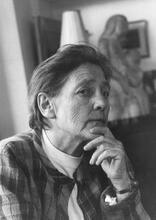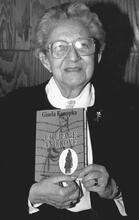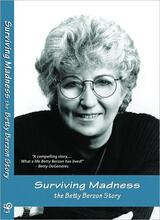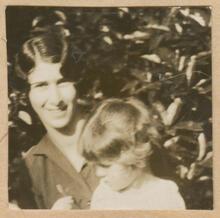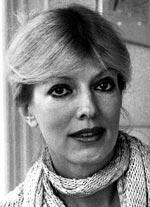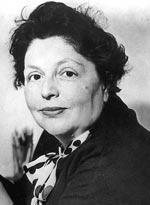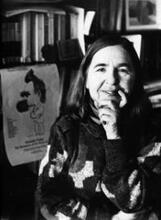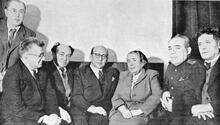Charlotte Wolff
A pioneering lesbian and feminist physician, Charlotte Wolff completed a doctorate in medicine in 1926. While working as an outpatient physician in Berlin’s working-class neighborhoods, Wolff became interested in sexology, psychotherapy, and chirology. When the Nazis came to power in 1933 she lost her right to treat patients. She eventually escaped to France and later to England; during this period she began researching and writing books on chirology. In 1937 she became a permanent resident of England and was allowed to practice as a psychotherapist. In the 1960s she turned her research to homosexuality and published a landmark study on lesbianism. Wolff did not practice Judaism and primarily associated with Quakers in England, but she always identified herself as a member of the Jewish people.
The pioneering Jewish lesbian feminist Charlotte Wolff was a physician by training, but later became a chirologist, psychotherapist, and sexologist, well known in both England and Germany.
Early Life & Education
The second daughter of Hans Wolff (1871–?), a grain dealer, and his wife Irene, née Engel (1874–?), Charlotte Wolff was born on September 30, 1897, in the small town of Riesenburg, West Prussia (today Prabuty in Poland, 75 km SE of Gdansk), but received most of her early education in nearby Danzig (Gdansk). She grew up in a liberal, middle-class German-Jewish household and had fond memories of both festive Friday night dinners and beautifully decorated Christmas trees in her childhood home. Although she learned to read Hebrew in Sunday school, she resented having to sit in the women’s gallery in synagogue on the High Holidays and not being able to participate in the services or understand the prayers. From a young age, Charlotte wished she had been born male and preferred male attire. As a teenager and thereafter, she was attracted to other girls and women. Both her family and members of her predominantly Jewish social circle accepted her preference for same-sex relationships.
Charlotte Wolff attended the Viktoria Schule, a Realgymnasium, or modern girls’ high school, in Dresden, which prepared her for university entrance. In 1920, she matriculated at the University of Freiburg, intending to pursue her interests in literature and philosophy; she took courses there with Edmund Husserl (1859–1938) and Martin Heidegger (1889–1976) and continued to write poetry, some of which was later published. However, she soon decided to earn her degree in medicine, rather than philosophy, in order to be able to support herself. She studied in Königsberg and Tübingen before completing her doctorate in medicine in Berlin in 1926. She suffered intermittently from agoraphobia, which sometimes proved debilitating.
Work in Berlin
After receiving her medical degree, Wolff completed an internship at the Virchow Hospital, treating prostitutes in the Department of Skin and Venereal Diseases. She then worked part-time as a physician in health insurance outpatient clinics in Neukölln and other working-class neighborhoods in Berlin, becoming deputy director for pre-natal services. Around the same time, she became interested in sexology, psychotherapy, and chirology, or hand reading. In 1931, she began working in the Institute for Electro-physical Therapy at the Neukölln clinic and was appointed its director the following year. She also had a small private medical and psychotherapeutic practice.
Although Charlotte Wolff never belonged to any political party in Germany, she was an active member of the Association of Socialist Physicians (Verein Sozialistischer Ärzten) and sympathized with the Unabhängige Sozialdemokratische Partei (Independent Social Democratic Party). She did volunteer work in a marriage counseling center in Berlin, distributing family planning information and providing poor women with Dutch caps and other birth control devices, until she was warned that her activities in pre-natal care and family planning made her politically suspect.
Rise of Nazism and Escape to France & Britain
The rise of Nazism in Germany adversely affected Wolff both personally and professionally. In the fall of 1932, her “Aryan” partner left her, fearing danger if she continued to share her life with a Jew. When the Nazis came to power in 1933, Charlotte Wolff, like other Jewish physicians, was dismissed from her position in the outpatient clinic and lost the right to treat patients covered by workers’ insurance. She was detained briefly by the Gestapo and informed that she was “a woman dressed as a man and a spy,” and her apartment was searched for incriminating communist literature. Soon thereafter, she managed to escape to France, where she lived for several years with friends in Paris and in Sanary, an artists’ colony, supporting herself by analyzing hands because, as a German refugee, she was not permitted to practice medicine.
In France and later in England, with help from the Quakers and various prominent individuals, she began researching and writing books on chirology. During her early days in London, she conducted research in experimental psychology at the Jewish Child Guidance Clinic and University College. In November 1937, Wolff became a permanent resident of England, gaining permission to practice as a psychotherapist, but not as a physician. During the war she worked in various hospitals and mental institutions and continued to publish articles in scientific journals. In 1941 she was made a Fellow of the British Psychological Society and in 1947 she became a naturalized British citizen, but she was not officially re-instated as a physician until 1952.
Research on Homosexuality
In the 1960s, after she started writing her first autobiography, homosexuality became her new field of research. In 1971 she published Love Between Women, a landmark study based on interviews with more than a hundred lesbians. She later wrote a book on bisexuality and a biography of Magnus Hirschfeld, the pioneering German-Jewish sexologist. Although she had been strongly grounded in German language and culture in her youth, after leaving Germany she ceased to consider herself German. In 1964, however, she returned to Germany for the first time since the war and in the 1970s her books began to be translated into German. Lesbians in Germany became interested in her work and in 1978 and again in 1979 invited her to come and speak about her experiences and her research on homosexuality and bisexuality.
Identification with Judaism, Lesbianism, & Feminism
Although a British citizen and not a Zionist, Wolff identified herself as part of the Jewish people, calling herself “an international Jew with a British passport.” As an adult, she neither believed in nor practiced Judaism; in England, she associated mainly with Quakers, not Jews. Yet despite a lengthy friendship with a Quaker who tried to convert her, she never accepted Christianity. As a Jew and a lesbian, she realized that she was a quintessential outsider belonging to two persecuted minorities, but towards the end of her life Charlotte Wolff found acceptance in British and German lesbian feminist circles, making important contributions to the study of homosexuality in both her adopted country and her native land. She died in London on September 12, 1986, shortly before her eighty-ninth birthday.
Selected Works by Charlotte Wolff
Studies in Hand Reading. London: Chatto & Windus, 1936.
The Human Hand. London: A. A. Knopf, 1942.
The Hand in Psychological Diagnosis. London: N.p., 1950.
On the Way to Myself: Communications to a Friend. London: Methuen, 1969.
Love Between Women. London: Duckworth, 1973.
Hindsight. London: Quartet Books, 1980
Magnus Hirschfeld: A Portrait of a Pioneer of a Pioneer in Sexology. London: Quartet Books, 1986.
Alpert, Rebecca. Like Bread on the Seder Plate: Jewish Lesbians and the Transformation of Tradition, 141–149. New York: Columbia University Press, 1997.
Freidenreich, Harriet Pass. Female, Jewish, and Educated: The Lives of Central European University Women. Bloomington: Indiana University Press, 2002
Wall, Renate. Verbrannt, verboten, vergessen: Kleines Lexikon deutschsprachiger Schriftstellerinnen 1933 bis 1945, 211–213. Cologne: Pahl-Rugenstein, 1988.
Lexikon, 396–397
IBD, II, 1260.

